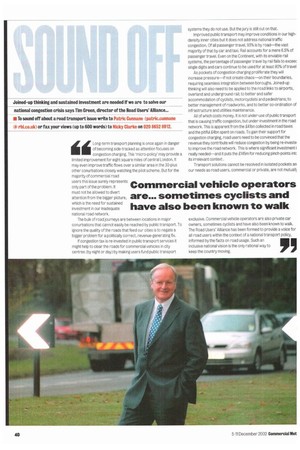dd Long-term transport planning is once again in danger
Page 40

If you've noticed an error in this article please click here to report it so we can fix it.
of becoming side-tracked as attention focuses on The bulk of road journeys are between locations in major conurbations that cannot easily be reached by public transport. To ignore the quality of the roads that feed our cities is to negate a bigger problem for a politically correct, revenue-generating fix.
If congestion tax is re-invested in public transport services it might help to clear the roads for commercial vehicles in city centres by night or day 'l ID:v making users fund public transport
systems they do not use. But the jury is still out on that.
Improved public transport may improve conditions in our highdensity inner cities but it does not address national traffic congestion. Of all passenger travel. 93% is by road—the vast majority of that by car and taxi. Rail accounts for a mere 6.5% of passenger travel. Even on the Continent, with its enviable rail systems, the percentage of passenger travel by rail fails to exceec single digits and cars continue to be used for at least 80% of travel
As pockets of congestion charging proliferate they will increase pressure—if not create chaos—on their boundaries, requiring seamless integration between boroughs. Joined-up thinking will also need to be applied to the road links to airports, overland and underground rail; to better and safer accommodation of cyclists, motorcyclists and pedestrians; to better management of roadworks, and to better co-ordination of infrastructure and utilities maintenance.
All of which costs money. It is not under-use of public transport that is causing traffic congestion, but under-investment in the road network. This is apparent from the £41bn collected in road taxes and the pitiful £4bn spent on roads. To gain their support for congestion charging, road users need to be convinced that the revenue they contribute will reduce congestion by being re-investe to improve the road network. This is where significant investment i really needed—and it puts the £145m for reducing pinch-points int its irrelevant context .
Transport solutions cannot be resolved in isolated pockets an our needs as road users, commercial or private, are not mutuall■i
exclusive. Commercial vehicle operators are also private car owners, sometimes cyclists and have also been known to walk. The Road Users' Alliance has been formed to provide a voice for all road users within the context of a national transport policy, informed by the facts on road usage. Such an inclusive national vision is the only rational way to keep the country moving.
























































































































































